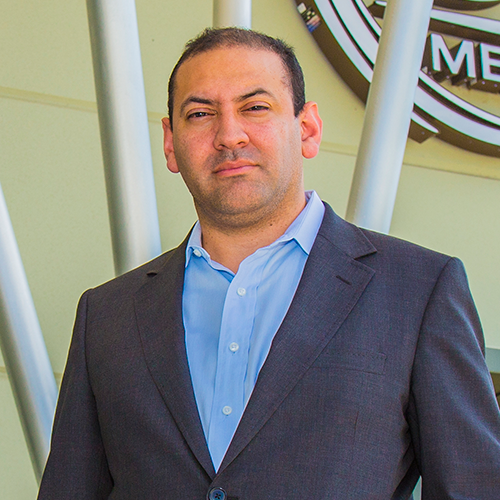Cutting and slicing their way through the thick Costa Rican rainforest was just a typical father-takes-daughter-to-work-day adventure in Ana Corrales’s childhood. Raised in San José, Costa Rica, Corrales was exposed to science, technology, engineering, and math (STEM) very early in life, thanks to her parents. Her father is an engineer, entrepreneur, and inventor in the energy industry, holding several patents. Her mother has a PhD in botany and was the dean of La Universidad de Costa Rica and later became the minister of science and technology for the country under the administration of former President and Nobel Peace Prize recipient Oscar Arias. Needless to say, Corrales’s passion, excitement, and talent for STEM is in her genes.
“I love when people say that [it’s hereditary],” Corrales says.
At the age of eighteen, during the early 1990s, Corrales relocated to the US to study. She obtained a bachelor’s degree in economics from the University of Washington and a master’s of science degree in engineering economic systems from Stanford University. It was in undergraduate school that Corrales met her husband, changed plans, and began her career in northern California.
“Girls, women, and Latinos, must have the audacity to dream and know they can do anything they want.”
Today, Corrales is the senior vice president of product operations for Cisco Systems. But both within Cisco and outside of the company, Corrales dedicates a majority of her time to mentoring and promoting STEM education for young girls, women, and Latinos. She is grateful to Cisco for providing the outlets for mentorship through programs such as Programa Escuela, which is a volunteer program for employees to teach elementary-level students about technology. Exposing young children to technology has been found to be the most successful method in getting them familiarized and interested long-term in STEM careers.
This year, Corrales was the recipient of the Tribute to Women Award for her work in empowering young women through mentorship.
She first came into mentorship without the label of mentor. Many years ago at a conference for Cisco’s Latino employee resource group, Conexión, a high school student explained to Corrales her dilemma between wanting to attend college and needing to work her current job at a car wash to continue helping her family financially. Without hesitation, Corrales enthusiastically encouraged the young girl to take every possible opportunity to continue her education. Six years later, the same young lady sent a letter to Corrales to say that she was graduating from Massachusetts Institute of Technology, thanks in great part to this one conversation she had with Corrales that impacted the trajectory of her life. “I remember reading it and getting teary. Getting that letter changed me very personally,” Corrales says. She is now one of the executive sponsors of the Cisco’s Conexión.
According to Corrales, women and Latinos should pursue STEM careers for numerous reasons. She explains that jobs in technology are personally and professionally more fulfilling because they pay well and offer flexible hours, which allow for the development of financial and personal independence. Many companies are also strategically invested in increasing Latino representation in the industry.
Encouraging the development of technology by increasing talent will also benefit the overall economy. “As consumers, Latinos as a whole are gaining ground in purchasing power. When an engineering team designs a product geared towards this audience, they’ll want to have a representative in the team from that market,” she says. Companies like Cisco have realized that it is best to avoid having homogeneous group of homogeneous that thinks alike.
About five years ago, Corrales’s team, was working on the feature design for a new product. A female engineer vocalized that she did not favor the design from an aesthetic viewpoint and offered an alternate proposal. If not for her input, the feature would not have been redesigned as successfully.
Men greatly outnumber women in the industry, and boys continue to outnumber girls in interest level. As a parent, Corrales sees this first-hand. Earlier this year, Luciana, who is Corrales’s eleven-year-old daughter, attended the iD Tech computer summer camp at the Stanford University location. Out of the total fifty youths enrolled, Luciana was one of only two girls in the class.
Corrales has two theories as to why: a small pipeline and motherhood. “We lose a ton of female representation as women approach the motherhood age group,” she says.
This visible lack of women in STEM industries contributes to a lack of female role models. Young girls need to see more women in STEM. Corrales believes she can contribute to that need through mentorship.
“My mom, because she was such an intellectual, believed women can do anything. For me, there were never any gender barriers put on interests,” Corrales says. “Girls, women, and Latinos, must have the audacity to dream and know they can do anything they want.”
EDITOR’S NOTE: At press time, Hispanic Executive editors learned that Ana Corrales would no longer be with Cisco. Corrales will now lead ww operations at Nest in Palo Alto, California. Hispanic Executive wishes Corrales all the best in her new position.

